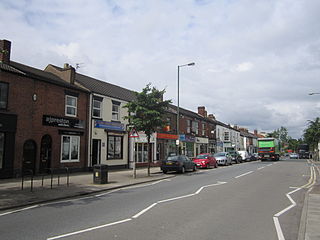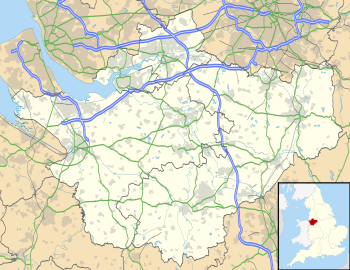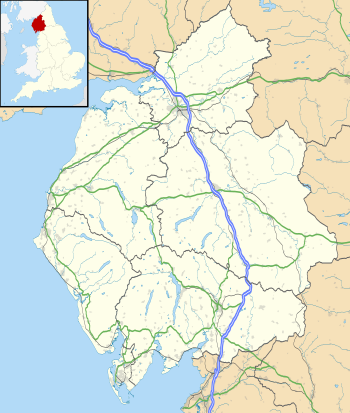
Lancashire is a ceremonial county in North West England. It is bordered by Cumbria to the north, North Yorkshire and West Yorkshire to the east, Greater Manchester and Merseyside to the south, and the Irish Sea to the west. The largest settlement is Blackpool.

North West England is one of nine official regions of England and consists of the ceremonial counties of Cheshire, Cumbria, Greater Manchester, Lancashire and Merseyside. The North West had a population of 7,417,397 in 2021. It is the third-most-populated region in the United Kingdom, after the South East and Greater London. The largest settlements are Manchester and Liverpool.

Newton-le-Willows is a market town in the Metropolitan Borough of St Helens, Merseyside, England. The population at the 2021 census was 24,642. Newton-le-Willows is on the eastern edge of St Helens, south of Wigan and north of Warrington.

The Warrington Wolves are a professional rugby league club based in Warrington, England. They play home games at the Halliwell Jones Stadium, and compete in Super League, the top tier of British rugby league.

The British Amateur Rugby League Association (BARLA) is an association for social and recreational rugby league. It works jointly with the Rugby Football League through the RFL Community Board.
James Leonard "Len" McIntyre, also known by the nickname of "Mac", was an English professional rugby league footballer who played in the 1950s, 1960s and 1970s. He played at representative level for Great Britain, Rugby League XIII and Lancashire, and at club level for St Helens, Barrow, Oldham, Liverpool City, Wigan, Warrington and Widnes, as a hooker, after retiring from playing he became the Warrington colts coach.
The 1982–83 Rugby Football League season was the 88th ever season of professional rugby league football in Britain. Sixteen teams competed from August, 1982 until May, 1983 for the Slalom Lager Championship.
The 1963–64 Northern Rugby Football League season was the 69th season of rugby league football.
The 1976–77 Northern Rugby Football League season was the 82nd season of rugby league football. Sixteen English clubs competed for the Championship, with Featherstone Rovers claiming the title.
The 1977–78 Northern Rugby Football League season was the 83rd season of rugby league football. Sixteen English clubs competed for the Northern Rugby Football League Championship with Widnes claiming the title by finishing the season on top of the League.
The 1986–87 Rugby Football League season was the 92nd season of rugby league football. Sixteen clubs competed for the Championship which was determined by League position.

The Lancashire County Rugby Football Union is the society responsible for rugby union in the county of Lancashire, England, and is one of the constituent bodies of the national Rugby Football Union having been formed in 1881. In addition it is the county that has won the County Championship on most occasions
Stockport RFC was a Rugby League club in Stockport, Cheshire, England.
The 1943–44 Northern Rugby Football Union season was the fifth season of the rugby league’s 'Wartime Emergency League necessitated by the Second World War.
As in the previous (fourth) Wartime season, the clubs each played a different number of games, but this season clubs re-joined the league and there were now 16 of the original clubs taking part in the Competition.
The League remained as one single amalgamated Championship.
Lancs/Cheshire Division 1 was a regional English Rugby Union league for teams from Cheshire, Merseyside, Lancashire and Greater Manchester, ranked at tier 8 of the English league system. The top two clubs are promoted to North 2 West and the bottom two clubs are relegated to Lancs/Cheshire 2. Each season two teams from Lancs/Cheshire 1 are picked to take part in the RFU Senior Vase - one affiliated with the Cheshire RFU, the other with the Lancashire RFU.
Runcorn FC was a rugby league club. Having formed in 1876 and played rugby union as members of the RFU, they joined the Northern Union in 1895, just several days after it was founded, and played in the league from 1895–96 to 1917–18.
The 1986–87 Lancashire Cup, known as the Grunhalle Lager Lancashire Cup for sponsorship reasons, was the 74th occasion on which the Lancashire Cup competition had been held.
The 1989–90 Lancashire Cup was the 77th occasion on which the Lancashire Cup competition had been held. Warrington won the trophy by beating Oldham by the score of 24-16 in the final. The match was played at Knowsley Road, Eccleston, St Helens, Merseyside,. The attendance was 9.990 and receipts were £41,804.
Whilst the sport of rugby league is played across Great Britain, it is most popular in its heartlands, the traditional counties of Yorkshire and Lancashire with the majority of professional and semi-professional clubs coming from this area of the country. Many fixtures are considered to be local derbies, where both teams come from the same town or city, or two that are very close to each other.
The 1939–40 Northern Rugby Football League season was an emergency season of English rugby league fixtures necessitated by the outbreak of the Second World War. The regular league season had started at the end of August 1939, but on the outbreak of war all sport was suspended. When government permission for sport to be resumed was given, the league was reorganised into two regional competitions, Yorkshire and Lancashire. The winners of each league playing against each other to decide the overall champions. The Yorkshire competition was won by Bradford Northern who beat Swinton, winners of the Lancashire competition, in the two-legged league final.










